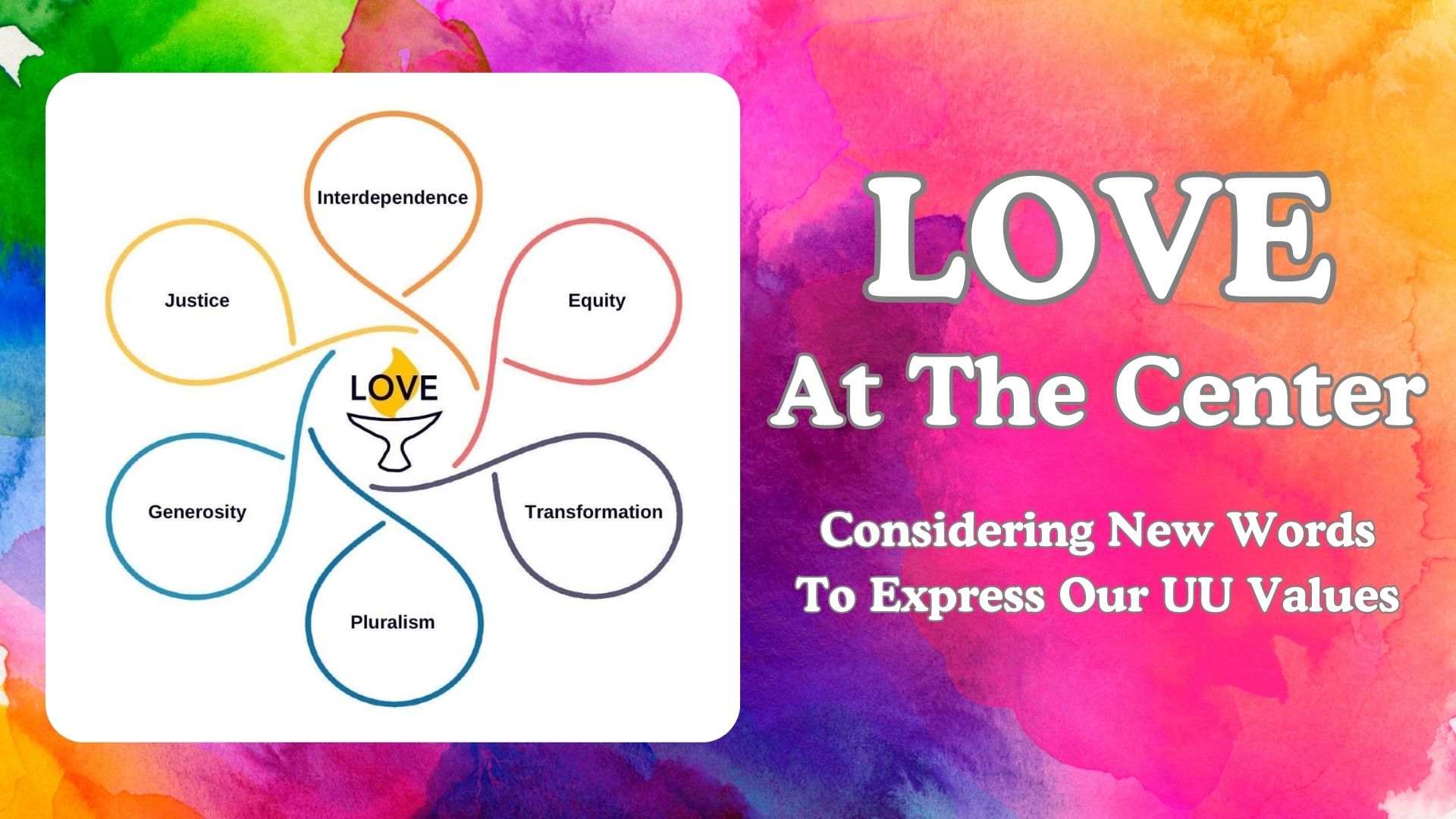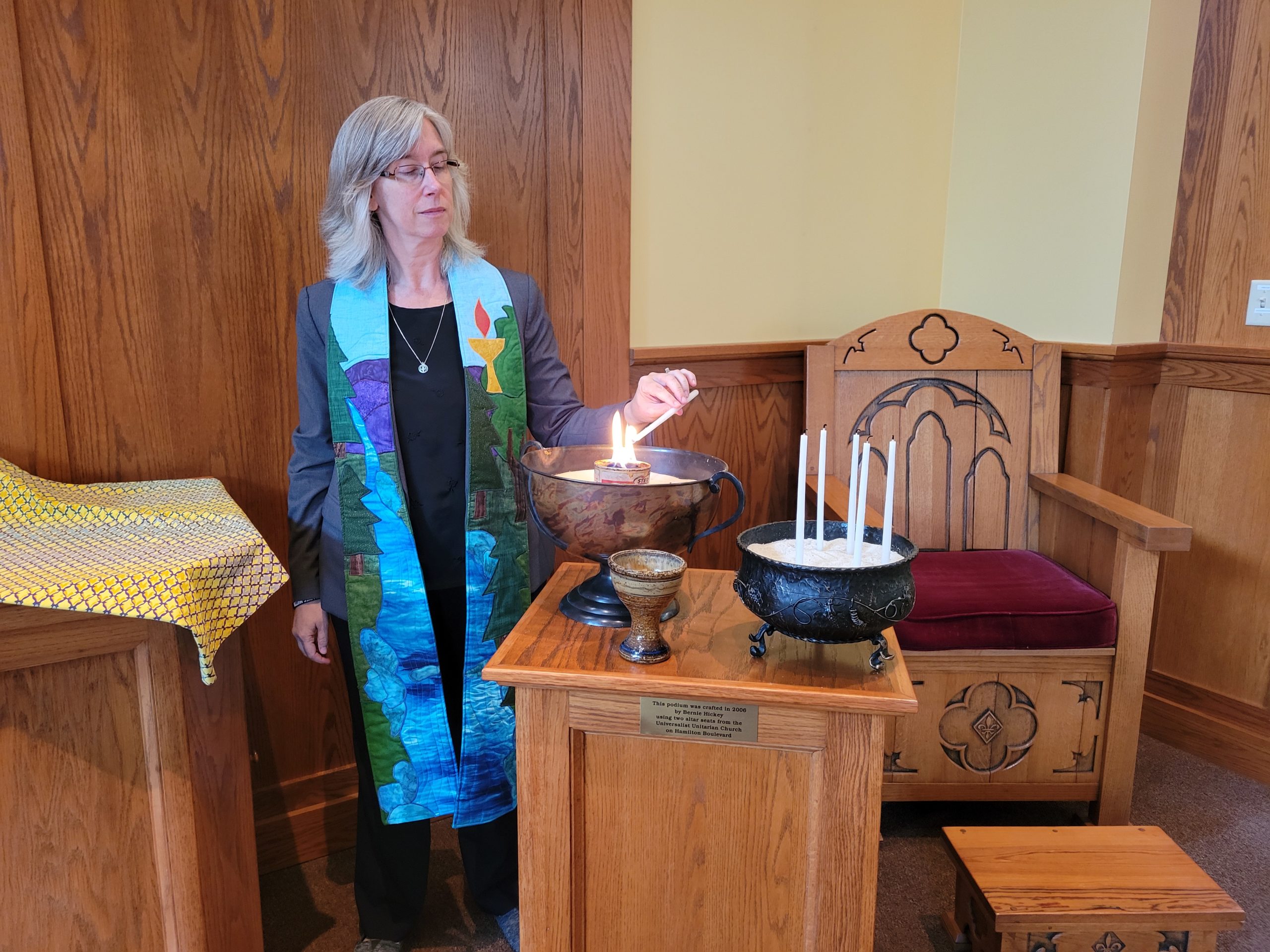What Is Unitarian Universalism?
Unitarian Universalism is a liberal religion that encompasses many faith traditions. Unlike most religions, it is not centered on specific theological beliefs. Unitarian Universalists are free to search for truth on many paths.
The Seven Principles
Although our individual religious beliefs vary, Unitarian Universalists uphold a set of shared principles. We affirm and promote:
- The inherent worth and dignity of every person.
- Justice, equity, and compassion in human relations.
- Acceptance of one another and encouragement to spiritual growth in our congregations.
- A free and responsible search for truth and meaning.
- The right of conscience and the use of the democratic process within our congregations and in society at large.
- The goal of world community with peace, liberty, and justice for all.
- Respect for the interdependent web of all existence of which we are a part.

Sources of Faith
Unitarian Universalism draws from many sources:
- Direct experience of that transcending mystery and wonder, affirmed in all cultures, which moves us to a renewal of the spirit and an openness to the forces which create and uphold life.
- Words and deeds of prophetic women and men which challenge us to confront powers and structures of evil with justice, compassion, and the transforming power of love.
- Wisdom from the world’s religions which inspires us in our ethical and spiritual life.
- Jewish and Christian teachings which call us to respond to God’s love by loving our neighbors as ourselves.
- Humanist teachings which counsel us to heed the guidance of reason and the results of science, and warn us against idolatries of the mind and spirit.
- Spiritual teachings of earth-centered traditions which celebrate the sacred circle of life and instruct us to live in harmony with the rhythms of nature.
Considering New Words To Express Our UU Values
At General Assembly 2023, delegates voted for member congregations to spend the next year considering a change to the section of the UUA bylaws that currently outlines our seven principles and six sources. This document was crafted with care by the Article II Study Commission with input from members and professionals throughout the denomination. A final vote to determine if we will replace the language in Article II will take place during the Virtual General Assembly in June of 2024. Read through this document and think about what this change might mean to you! Note, this wording is not finalized and subject to updates.
Click the image below to be taken to a PDF of the document:
The UUA
The Unitarian Universalist Association (UUA) is an organization of over 1,000 liberal religious congregations in the United States. Each congregation is self-governing. Together, the member congregations support each other and bring to the world a vision of religious freedom, tolerance, and social justice.
Historical Background
Unitarian Universalism arose from two liberal religions, both of which were originally part of the Christian tradition.
- Unitarians believed in the oneness of God and questioned the Trinity.
- Universalism was founded on the premise that a loving God would not condemn a person to eternal punishment for earthly errors.
The two denominations merged in 1961. Over the years, Unitarian Universalism has evolved into an even more open and accepting faith.
Many UU congregations begin their worship services by lighting a flame in a chalice. This symbol of Unitarian Universalism has multiple origins and meanings.
Unitarian Universalist or Universalist Unitarian?
You’ll see and hear the name both ways. When the Unitarian and Universalist denominations merged in 1961, the combined organization became known as the Unitarian Universalist Association. However, our Peoria congregation voted to call itself the Universalist Unitarian Church. Our name honors the fact that we were a Universalist church before the merger.
If you can’t keep the names straight, don’t worry—put them in either order, or just say “UU.” We’ll know what you mean!
The Flaming Chalice
- In 1415, Bohemian church reformer John (Jan) Huss was burned at the stake for his heresies. One of them was offering the communion chalice to the common people. After his death, the combination of the chalice and the flame became a symbol of religious freedom.
- During World War II, the Unitarian Service Committee adopted the flaming chalice as its symbol during its efforts to help refugees escape Nazi persecution.
- Over the years, the flaming chalice became the symbol of Unitarian Universalism. To many, the chalice represents religious community. The flame is often thought of as a symbol of truth, spirit, freedom, sacrifice, or other ideas.
- Sometimes the flaming chalice logo appears within two interlocking circles. These circles represent the merging of the Unitarian and Universalist denominations.
For More Information
Unitarian Universalist Association
Our Unitarian Universalist Faith: Frequently Asked Questions
100 Questions That Non-Members Ask About Unitarian Universalism


